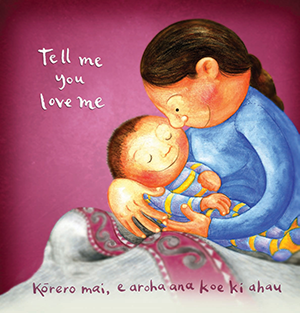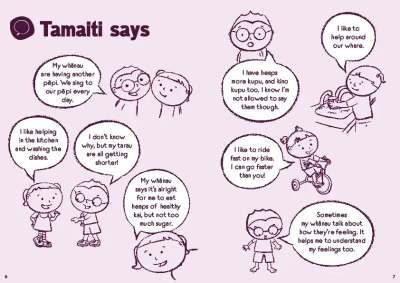
Happy and healthy – Parenting a 3-year-old
Happy memories reflect a happy childhood. Using simple tasks and activities, whānau can create happy, healthy experiences for their child.
In this video from the Ministry of Health, we meet parents Ria and Barry, who have 2 tamariki aged 3 and 4. They talk about caring for their children and working towards their goals for their children – to grow up happy and healthy.
Parents Ria and Barry talk about parenting (transcript)
Title: Your Child: Three to Five Years. Episode 12 of 15.
Title: Ria & Barry’s Whānau
[Shots of Ria and Barry’s home.]
Ria (voice-over): It's not easy, but it's worth every moment. It's definitely one of the hardest things you'll ever do – being a parent – but it also has the best rewards.
[Shot of Kārearea and Ocean.]
Title: Kārearea, 4 years old; Ocean, 3 years old
[Interview with Ria and Barry.]
Ria: Kia ora koutou. Ko Ria tōku ingoa. Nō Porirua ahau. Ko tēnei te wāhi tipuaki ai ahau.
Barry: I'm Barry. This is my partner, Ria. We have two beautiful children. Ocean, he's three. Kārearea, she's four.
Ria: In our home, we create a safe environment by putting the toxic products up high, so the kids can’t reach them.
[Shot of Ria and Barry’s fenced section and vegetable garden.]
Ria (voice-over): We also have a fully-fenced section so the kids can't run out onto the road. It's really important that we keep our tamariki healthy, because we believe that for them to be the best that they can be in life, they need to be physically and mentally fit.
Barry (voice-over): We don't really eat junk that much. We just try and get fruit into them.
Ria (voice-over): We also have a garden, where we get most of our leafy vegetables.
Barry (voice-over): Stuff that you can mash up so they don't know it's there!
[Interview with Erika.]
Title: Erika Ware, Well Child Tamariki Ora Nurse
Erika: Kia ora. I'm Erika, and I'm a Tamariki Ora (Well Child) Nurse. The best advice that I could give at this age would be to spend as much time together doing things, so that children are learning at the same time, as well as you're there supervising them, letting them do stuff, and that's the best way to learn, to have fun, and be safe together.
[Barry fastens Ocean’s helmet, and rides a skateboard with him.]
Barry (voice-over): The stuff that I mainly do with the kids is the more active stuff on their bikes and skateboards.
[Ria draws with Kārearea.]
Ria (voice-over): Kārearea likes to draw, so I’ll sit with her and draw, and we'll learn how to spell her name. Just having those things there to provide an outlet for them to be creative.
[Ria and Barry play with their children.]
Ria (voice-over): They light up when they're with mum and dad, and mum and dad are interacting with them. It doesn't have to be anything special or grand. It's just being with them. When just dad and the kids are playing around on the floor, just tickling and horseback riding – dad's the horse! The kids jump on.
[Ria prepares vegetables.]
Barry (voice-over): So with their teeth, we stay away from real sugary stuff. It's just a real treat. We get them to brush their teeth, and then we'll do it afterwards just to make sure it got done properly. But still trying to get them to figure out how to do it.
[Interview with Erika.]
Erika: The best practice you can do is supervising your children when they brush their teeth, and making sure that they brush morning and night. Using a soft toothbrush with a smear of family fluoride toothpaste is recommended.
[Interview with Ria and Barry.]
Ria: Our Tamariki Ora (Well Child) Nurse rang me and organised for me to see the B4 School Check Nurse.
[Interview with Erika.]
Erika: It involves a hearing and a vision test. They see us. There's a questionnaire that parents need to fill out. And it also involves pre-school teachers doing a bit of an assessment.
[Ria and Barry play with their children.]
Ria (voice-over): Our goals for our children are for them to be happy and healthy, and to enjoy their childhood, so we try and make memories as much as we can by creating fun things as a family that we do together.
Barry (voice-over): Our goals for when they're older – just pretty much do what they really want to do in life. That’s pretty much it.
[Interview with Ria and Barry.]
Ria: We also work really hard on trying to develop their character. So we do that by going to the river and talking about the taiao and the environment, and how it's really important that we take care of it. That's something that's important to us, it's important to our children, and it's important for their children. Te reo Māori is also a strong aspect, a strong part of the taiao, so we really try and incorporate that because it gives them a strong sense of identity. It gives them a stable foundation for them to stand on and grow into confident people.
Title: Our thanks to the families and health workers who appeared in this video for the Ministry of Health. Find out more about pregnancy and child health on www.health.govt.nz/yourhealth(external link).
Ria and Barry share the things that are important for them and their children.
Here are some suggestions to help start a conversation with the whānau.
Ask whānau:
- What do you think of Ria and Barry’s kōrero?
- What do you think about the goals they talk about?
- Ria says that being a parent is difficult but has the best rewards. What do you think she means by this?
- What are your thoughts about being a parent?
Remember the simple things
Ria and Barry talk about making memories: skateboards, drawing, gardening. It doesn’t have to be anything special or grand.
- What were some happy memories from your childhood?
- Are there any particular activities that come to mind, such as beach trips, walks in the ngahere , ball games, picnics, tree climbing?
- What memories are your tamariki building now?
- What memories would you like them to have?
- What can you do about it?
- What do you think about the advice that Erika, the Well Child Tamariki Ora nurse, gives?
- Are there any questions you’d like to ask your Well Child Tamariki Ora nurse?
- Would you like to put some questions together for your nurse?
Using Ngā Ara Mātua – parenting pathways
The 'ngā ara mātua' resource help us focus on the wellbeing and security of our tamariki. Look at Ara Mātua 3–4 years with whānau.
Ask the whānau if there are any ideas they want to try. Some new routines or activities can be refreshing and enjoyable to add into the family’s day-to-day existence.
Even simple things like spending some time every day playing and being with our child can make a difference. Although it sounds pretty basic, sometimes the reality of parenting is we get distracted with other things and the day flies by. So, it’s a matter of doing the simple things but doing them every day and being fully engaged with our tamaiti when we do them.
Having a few simple rules – and sticking to them. Again it sounds simple, but it’s very easy to forget or let it slip. And we need to follow through on things ourselves if we want to help our tamariki to make some positive changes, too.
Suggest to whānau that you work out a few simple tasks together, either from the suggestions in ngā ara mātua or by making up something especially for their tamaiti.
All the self-care things like teeth cleaning, dressing themselves, sitting down to eat a healthy meal or avoiding sweet or unhealthy kai can be looked at in the same way as ngā ara mātua. They are all about guiding our tamaiti on a path towards health and happiness.
As the tamaiti says in Whakatipu Te Māhuri (page 6), "My whānau says it’s alright for me to eat heaps of healthy kai, but not too much sugar."
Helpful resources for whānau
-
Keeping kids safe
Product Safety
Information for whānau about product safety and keeping kids safe, by choosing safe products and learning to use them properly.
-
Eating for healthy children aged 2 to 12
HealthEd
This booklet gives advice for parents, whānau and caregivers on the types of food children need to eat to be healthy. It also describes how children can be active in everyday life.












